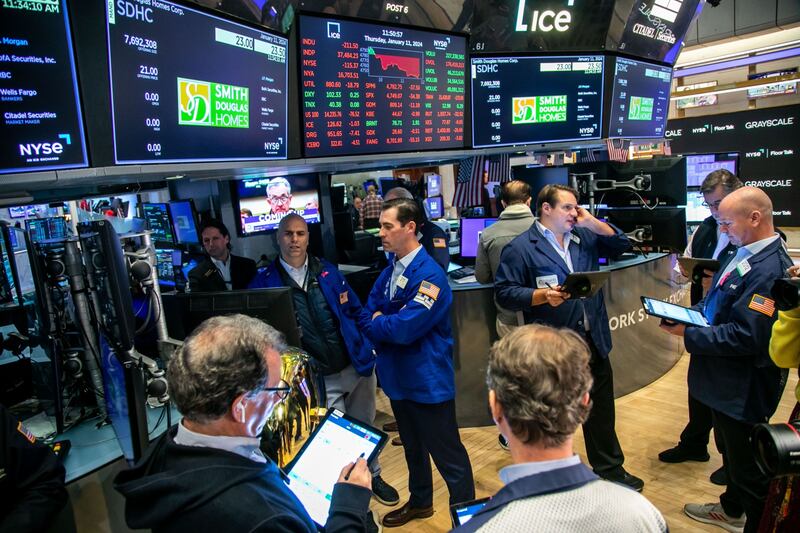Global stock markets settled mostly higher as Wall Street made a gain to pick up its 10th weekly win in 11, as a key inflation report provided more hope that the Federal Reserve would begin cutting high interest rates.
Market players are pinning their hopes that the US central bank will reduce rates after the US producer price index posted a surprise decline in December when diesel and food costs dipped, which is a sign that inflation will continue to taper down.
The PPI inched down 0.1 per cent last month, the Labour Department reported on Friday. That was a third straight decline and off the 0.1 per cent rise predicted by economists polled by Reuters.
On Thursday, the Labour Department said that inflation in the US rose 3.4 per cent year-on-year, up from 3.1 per cent in November, beating a FactSet forecast that called for a 3.2 per cent rise.
The report – the first US inflation reading this year – comes as traders forecast when the Fed will cut interest rates this year and by how much.
Ahead of the report, data from the CME Group showed most forecast the Fed would announce its first rate cut of this policy cycle in March. Most expected interest rates to fall somewhere between 3.75 per cent and 4.25 per cent by the end of this year.
The CPI report was "less than ideal and the market reaction was mixed", Ipek Ozkardeskaya, a senior analyst at Swissquote Bank, wrote in a note.
"Disinflation remains the base case scenario for this year ... yet some hawkish voices are rising at the Fed, at the start of this year," she said.
Ms Ozkardeskaya noted Bank of Cleveland president Loretta Mester's comments this week that it is probably too early to cut rates, and Bank of Richmond president Thomas Barkin looking for more evidence that inflation is headed toward the Fed's 2 per cent target.
On Wall Street, the Dow Jones Industrial Average retreated 0.3 per cent, while the S&P 500 and tech-heavy Nasdaq Composite barely inched up and were virtually flat.
For the week, the Dow added 0.3 per cent, the S&P 500 gained 1.8 per cent and the Nasdaq advanced 3.1 per cent. Year-to-date, all three indices are up 0.3 per cent.
In Europe, London's FTSE 100 rose 0.6 per cent, lifted by commodity stocks. However, it posted a weekly decline as uncertainty loomed over interest rates.
The Bank of England's Monetary Policy Committee has set its sights on a 2 per cent inflation target and "in a way that helps to sustain growth and employment", it said.
In other major European bourses, Paris' CAC 40 jumped 1.1 per cent and Frankfurt's DAX gained 1 per cent.
Earlier in Asia, Japan's Nikkei surged 1.5 per cent, extending its substantial winning run in 2024 to post another 34-year high, outpacing all other major global markets so far in the new year.
Hong Kong's Hang Seng Index and the Shanghai Composite retreated 0.4 per cent and 0.2 per cent, respectively.
In commodities, oil prices surged on Friday before settling around 1 per cent higher after the US and UK struck Houthi targets in Yemen and Iran seized a tanker in the Gulf of Oman, stoking fears of an escalation in geopolitical tensions that could threaten trade and oil flows.
Brent rose 1.14 per cent to close at $78.29 a barrel, while West Texas Intermediate added 0.92 per cent to settle at $72.68 a barrel.
Gold, meanwhile, jumped 1.6 per cent to settle at $2,051.60 per ounce, as its safe-haven appeal shone amid the ongoing tensions in the Middle East.
The precious metal, which is also a hedge against inflation, was mostly flat during the week but added as much as 1.7 per cent on Friday.







